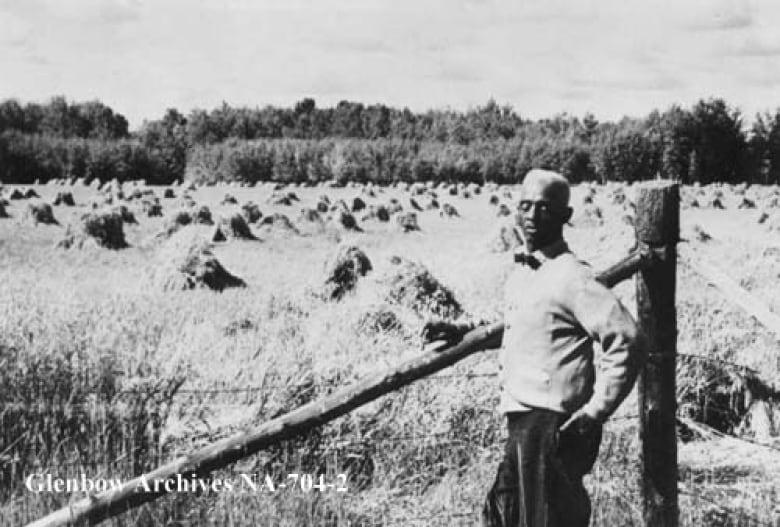Nov. 28, 2018
Social Work prof captures stories of Alberta's black settlers in award-winning film

J. D. Edwards stands beside a grain field in Amber Valley.
Glenbow Archives NA-704-2
- Note: Free screening of We Are the Roots: Black Settlers and Their Experiences of Discrimination on the Canadian Prairies is scheduled for Dec. 12, 2018, 7 to 9:30 p.m. at the Glenbow Theatre Museum. Performance by Wakefield Brewster and members of the Shiloh Baptist Church choir. Pastries, coffee/tea, and refreshments will also be served.
It’s a Canadian story that isn’t often told: The story of a group of courageous pioneers who came to Alberta from Oklahoma, Missouri and Texas between 1905 and 1912. Fleeing growing systemic racism, they were lured here by the promise of nearly free land and a better life.
More than a thousand came to the Prairies, looking for their new Eden in places like Amber Valley, Campsie and Breton in Alberta and Maidstone in Saskatchewan. What they found, besides waist-deep snow, wasn’t exactly Eden, and as usual it has taken many years to fully understand their experience.
A film entitled We are the Roots: Black Settlers and Their Experiences of Discrimination on the Canadian Prairies recently captured some of the largely oral history of these Prairie black settlers before it was lost forever. The project was spearheaded by Deborah Dobbins, president of Edmonton’s Shiloh Centre for Multicultural Roots (SCMR), who engaged the research that was led by University of Calgary Faculty of Social Work professor Dr. David Este, PhD, and Dr. Jenna Bailey, PhD, an adjunct professor with the University of Lethbridge.
The film project has been recognized with four major awards including the Governor General's History Award for Excellence in Community Programming, the Heritage Awareness Award from the Alberta Historical Resources Foundation, and two awards from the Oral History Association (OHA), North America’s most important oral history association. The film won OHA’s most prestigious award, the Elizabeth B. Mason Major Award, and the OHA’s award for Oral History in Non-Print Format.

Faculty of Social Work professor David Este says the project has been a very rewarding experience.
Kloie Picot, Faculty of Social Work
A social work lens to black settler history
Este, who holds a master’s degree in African-Canadian history, is well known for his research in the field of social work. He says the project allowed him to combine his passion for African-Canadian history with his unique social work perspective — shining a light on settlers who helped make Alberta what it is today.
“These African-American settlers really did contribute and have contributed to the making of Albertan society,” says Este. “I think it's important from a social work perspective because when I look at Canadian social welfare history, it basically excludes Indigenous Peoples and different racialized groups such as a people of African or Chinese descent and other communities. So this history makes a contribution to the social literature.”
Este says that by looking at how these African-Americans settled in Alberta and the mutual support that they provided each other through community vehicles like the church, provides a “very, very important lesson for social work.” The oral histories outline how the early African-Canadian communities were formed. Often the church was the pillar and social hub in their communities. As a result, ministers also became very important figures as agents who attempted to break down racial barriers in Canadian society.
The Canadian 'colour bar'
That colour bar was a very real thing faced by black settlers, who discovered Canada wasn’t much different than the United States when it came to discrimination. A big part of the reason Dobbins and the SCMR pursued the project was to better understand how discrimination shaped black settlement in Alberta. Este and Bailey interviewed 19 second- and third-generation descendants of the black settlers, pulling together a picture of the tough life the settlers carved out for themselves as well as the discrimination and racism they encountered.

The Amber Valley baseball team.
Glenbow Archives NA-704-5
Less racism in rural communities
Interestingly, the documentary team found that black settlers in rural areas like Campsie and Breton faced less racism than those who settled in Calgary or Edmonton. Este speculates that in isolated rural communities, the black settlers became integral parts of the agricultural community.
“When it came time to work on the farm and harvest," says Este, “whether you were Ukrainian or from another European country, or black, they all worked together — they helped each other with the responsibilities on the farm.”
The oral histories from those who wound up in Edmonton were, however, quite different and Este says from the moment they arrived in Edmonton, black settlers faced discrimination.
“There was a severe, severe backlash,” says Este. “For example, we got copy of a petition written in 1911 that was sent to Wilfred Laurier’s government in Ottawa and Immigration Minister Frank Oliver, that basically pleaded with the federal government to abolish black immigration to Canada. So the degree of hostility African-Americans faced in Edmonton was quite, quite strong. Our respondents stated that when their family members attempted to attend white churches they were either denied or were seated in what were called 'nigger pews' way in the back.”
Lessons from the past inform the future
In reflecting on what he learned from the project, Este is quick to point out that history is full of lessons and since Canada's immigration policy and practices are increasingly in the spotlight, projects like this one can help us to better understand the settlement process. He says he learned a deep appreciation for the resilience and resourcefulness the black settlers had in carving a place for themselves in Alberta.
“I've been a social work professor for over a quarter of a century,” says Este. “I’ve been involved in a lot of research projects, but working with my two colleagues on this project has definitely been one of the most rewarding experiences I've had as a professor.”
